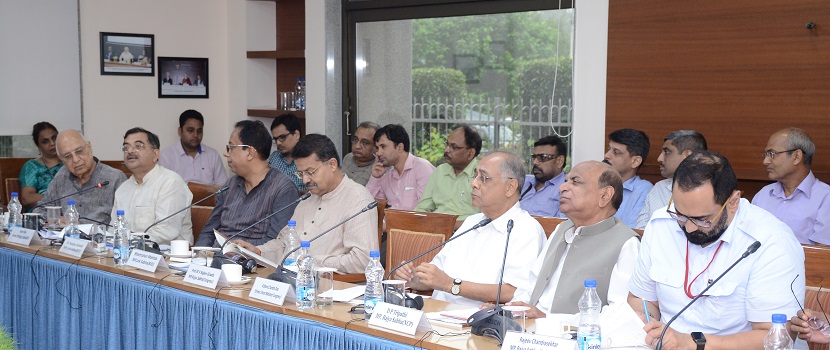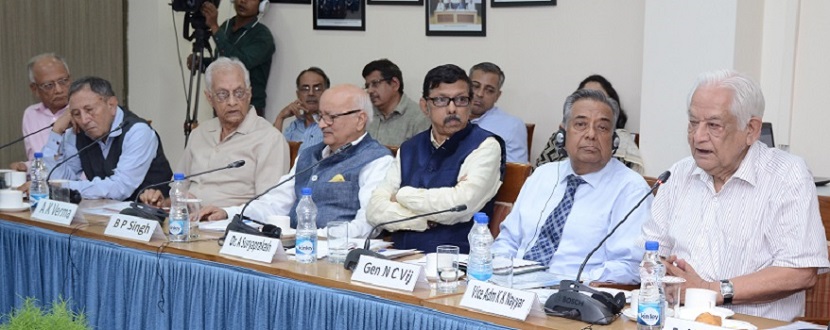With the Council of States i.e Rajya Sabha increasingly perceived as an arena for political muscle-flexing and stonewalling key legislations of the government in recent years, there has been growing demand in the country to review its composition and functioning. Most notably, Prime Minister Narendra Modi himself made a strong pitch for holding elections to the Lok Sabha and state assemblies together at a BJP meeting in March, while Madhya Pradesh Chief Minister Shivraj Singh Chouhan, according to media reports, has suggested scrapping the Rajya Sabha altogether.

In order to debate the issue further, potentially looking for some consensus on the issue among major political parties, the Vivekananda International Foundation (VIF) invited a few current and former Members of the Parliament representing major national and regional political parties, including the ruling BJP, Congress, BJD and NCP and experts of the Constitution, notably Dr. Subhash C Kashyap and Dr. VK Agnihotri, both former General Secretary of the Lok Sabha and the Rajya Sabha respectively, for a Round Table Discussion on 27 July 2016. Members of the Parliament taking part in the deliberations who made valuable contributions to the debate included, Mr. Tarun Vijay (BJP), Mr. Shivkumar Udasi (BJP), Mr. Kishore Chandra Deo (Congress), Mr. Rajeev Gowda (Congress), Mr. D. P. Tripathi (NCP), Mr. Bhartruhari Mahtab (BJD), and Mr. Rajeev Chandrasekhar (Independent). With General NC Vij, Director, VIF, in the Chair, Dr. A. Surya Prakash, Distinguished Fellow, VIF and Chairman, Prasar Bharati moderated the discussions.
In his agenda-setting remarks, General Vij argued that setting up the second chamber in the Indian Parliament was preceded by an extensive debate among framers of the Constitution who broadly agreed that it was necessary so as to bring sobriety in the debate over legislations and quality to the bills passed by the Parliament.

However, 66 years down the line it is time to reflect on whether the Rajya Sabha has stood the test of time broadly in light of emergence of many regional parties which have not only constricted the base of national parties but also changed the complexion of the Rajya Sabha, besides impacting coordination between the two houses of the Parliament. After making the initial remarks, General Vij requested Dr. Surya Prakash to conduct the rest of the proceedings. In his opening remarks, Dr. Surya Prakash nudged Members of the Parliament to think over whether giving equal status to the Upper House except in money bills has affected the law-making process itself?
The consensus view among the lawmakers was that the Rajya Sabha continues to hold relevance in a federal structure, although there is plenty of room for reform as regards it functioning and composition. In a stinging criticism of the way proceedings are held in the Rajya Sabha, Mr. Tarun Vijay of the BJP lamented, “the problem occurs when for instance…out of the 17 days of Monsoon Session until now, 82 hours were filled with chaos.” Mr. Sanjay Jaiswal, who represents Paschim Champaran constituency in Bihar, observed that many of the Upper House members don’t take up issues pertaining to the states they represent, while others said that many a time members who get elected to the Rajya Sabha do not belong to the state they represent. Dr. Subhash Kashyap, said “efforts should be made to achieve what was envisaged in Constitution. Rajya Sabha is a Council of State. It is supposed to represent states. But we see someone who has never stayed in a particular state, doesn’t know people there, is unaware of culture there, becoming that state’s representative in Rajya Sabha…so, this is a contradiction,” Mr Kashyap said.

Mr. DP Tripathi said the need for introducing people with expertise in different domains as members of Rajya Sabha was envisaged while it was being formed and the need for giving the MPs adequate time to raise and discuss issues. “Hence, there is a need for improvement, rules need to be amended. The House should function properly, there should be no obstruction. There should be debates,” Tripathi said. Rajya Sabha member Rajeev Chandrasekhar said the only reform required is to see political parties use veto right for the right purpose than for obstruction.
There was broader consensus among participants for holding simultaneous elections to the Lok Sabha and the state assemblies, although a few members expressed doubts over its feasibility. It was agreed that the subject, being a politically sensitive one, needs to be studied in greater depth and broader consultations need to be held amongst political parties so as to evolve consensus on reforming the Rajya Sabha. It was largely agreed that the matter could be referred to a select committee of the Parliament.






